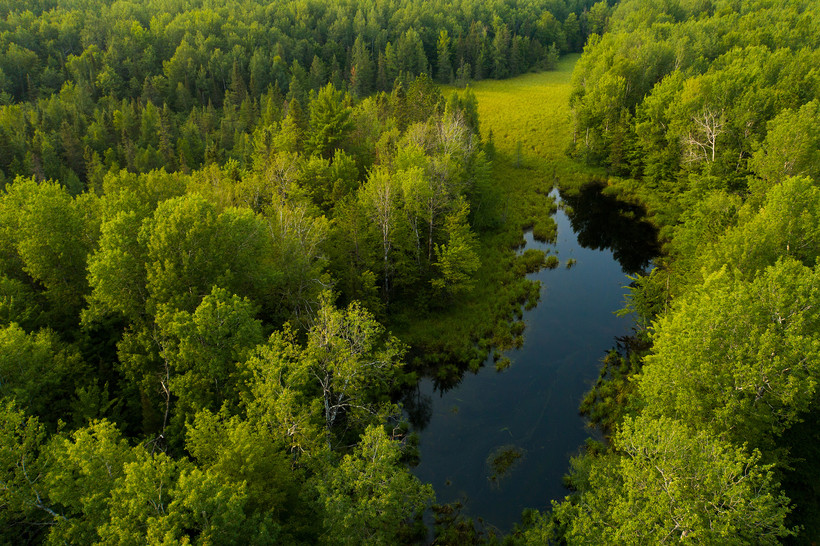Legislative Committee Rejects Funds for State’s Largest Land Conservation Plan
Republicans spike proposal to preserve 70,000 acres of forest in northern Wisconsin.
Wisconsin’s largest land conservation effort is $4 million short after the Legislature’s finance committee voted against using money from the state’s land purchase program for the project on Tuesday.
The move is a setback for the state’s plans to set aside 70,000 acres east of Rhinelander for the Pelican River Forest in northern Wisconsin. The Department of Natural Resources must now come up with other funds if it hopes to match a $10.8 million federal grant and keep the project alive. The agency has previously said it may need to seek a landowner donation or launch a fundraising campaign if stewardship funds were unavailable.
Voting 12-4 along party lines, lawmakers on the Joint Finance Committee objected to using $4 million under the state’s Knowles-Nelson Stewardship Program to purchase a conservation easement on 56,000 acres. They highlighted concerns of local towns about the project. Republican Rep. Mark Born of Beaver Dam, who co-chairs the finance committee, said the DNR mismanaged its handling of the stewardship request by failing to properly engage local communities.
“The DNR should be embarrassed,” Born said. “They should be ashamed for what they did on this project.”
Local governments like the town of Monico and Langlade County raised concerns about the project and the 30-day timeframe for providing input on the proposal last fall. The town wants to preserve some of the land running along Highways 8 and 45 for residential and commercial development.
State Sen. Mary Felzkowski, R-Irma, was the only member of the committee that publicly voiced opposition to the project prior to Tuesday’s hearing. The committee’s co-chair Sen. Howard Marklein, R-Spring Green, also acknowledged he objected to the project on Tuesday. Felzkowski and other Republican legislators have opposed taking land up north off the tax rolls into perpetuity, limiting options for local growth.
“We have areas that are going broke, and we continue to take the tools away from them to allow them to be economically viable,” Felzkowski said. “So enough is enough.”
Felzkowski said Republicans will be introducing legislation to ensure stewardship proposals don’t move forward until local governments and residents are “100 percent on-board.”
Democrats on the committee called for increased transparency around the Legislature’s review of stewardship projects. Currently, lawmakers on the state’s finance committee can raise anonymous objections to projects. Gov. Tony Evers‘ budget proposal would force lawmakers who raise objections and their reasons to be made public. Democrats and conservation groups note the committee’s co-chairs failed to schedule hearings after lawmakers raised objections to projects, leaving them in limbo.
Rep. Evan Goyke, D-Milwaukee, said the current process is broken and criticized GOP lawmakers for secrecy surrounding their objections to past projects. Those projects included a land conservation effort in Ozaukee County that almost failed last year after an anonymous lawmaker objected to the deal.
“If you’re going to empower folks locally, I hope that you disempower folks here to secretly object and uphold or stall the process, or that you put a back-end timeline by which this committee must act,” Goyke said. “I can appreciate locals that object to a project, but please look at the other side of the coin when there are locals that deeply and passionately support a project, but it’s blocked in secret by one member of this committee.”
While some local communities oppose the project, the Pelican River Forest has received widespread support from conservation groups that include Gathering Waters, the Wisconsin Conservation Congress and Wisconsin Wildlife Federation.
DNR Secretary-designee Adam Payne said last week he only recently became aware of town resolutions opposing the Pelican River Forest. He said there was a breakdown in agency communication that meant the Natural Resources Board was unaware of local opposition, calling it an oversight. Payne, who has yet to be confirmed by the Senate, has said the DNR will be reaching out to local governments to ensure their questions and concerns with the project are addressed. He also said the agency should provide twice as much time for local governments to weigh in on stewardship proposals.
Born rejected Democrats’ assertions that the committee is operating in secret or that its process is broken. He said the agency’s mishandling of the stewardship request highlighted the need for oversight from the Legislature.
Sen. Kelda Roys, D-Madison, said oversight doesn’t mean raising objections to proposals “and then killing them in the dark of night.”
“Oversight means bringing the public into the process. We are the branch that’s closest to the people,” Roys said. “Having a public hearing, to me, that would be an appropriate use of our oversight role.”
Some argue the Evers administration could still award funding
Despite the committee’s decision, Charles Carlin, director of strategic initiatives for Gathering Waters, said he believes the DNR and Evers administration could award stewardship funding for the Pelican River Forest. He argued that lawmakers aren’t following the explicit language of the statute for passive review of such proposals.
The law states that a state agency may obligate money for a project if the committee’s co-chairs do not notify the department within 14 working days that the committee “has scheduled” a meeting to review the proposal. In their objection to the Pelican River Forest, the committee’s co-chairs wrote a meeting “will be scheduled.”
“It has to be scheduled. If they don’t do that they relinquish their oversight authority, and the DNR may obligate the monies,” Carlin said. “That is the plain language of the statute.”
A Wisconsin Legislative Council review last year found the state’s finance committee is likely not following state law to delay DNR’s obligation of stewardship funds due to that distinction in the language. Despite that, the staff attorney who authored the memo cautioned that state courts “have historically been reluctant to interfere in disputes between the two ‘political’ branches of government.”
Wisconsin Watch reported that the DNR previously raised the issue after six conservation projects were held up without a hearing. However, the nonprofit investigative news outlet reported that the Evers administration declined to comment on legal issues and no complaints had been filed with the state.
The Conservation Fund, a national nonprofit group, bought the property that spans parts of Oneida, Langlade and Forest counties in 2021. The group has been working with the DNR to secure easements for the land that’s intended for public use and logging.
The Pelican River Forest includes 68 miles of streams and 27,000 acres of forested wetlands, straddling the divide between the Lake Superior and Mississippi River basins. The property serves as a link between the Oneida County Forest and Chequamegon-Nicolet National Forest. Supporters say the forest benefits the climate by storing the equivalent of carbon emissions released by 4 million cars each year, and it’s expected to support 775 forest-related jobs.
Last fall, the Natural Resources Board signed off on a $15.5 million easement to preserve more than 56,000 acres of the forest. In 2021, the board approved a $4.7 million easement on 12,500 acres within the forest without objections from lawmakers.
The Conservation Fund has said the forest’s 70,000 acres would remain in private ownership and continue to contribute around $73,000 in taxes each year.
Since 2015, the DNR has said 19 projects north of Highway 64 have gone to the Joint Finance Committee for their approval and five have yielded objections. Those projects were ultimately paid for through alternative funding sources.
Editor’s note: This story will be updated.
Legislature’s finance committee rejects funding for Wisconsin’s largest land conservation effort was originally published by Wisconsin Public Radio.

















